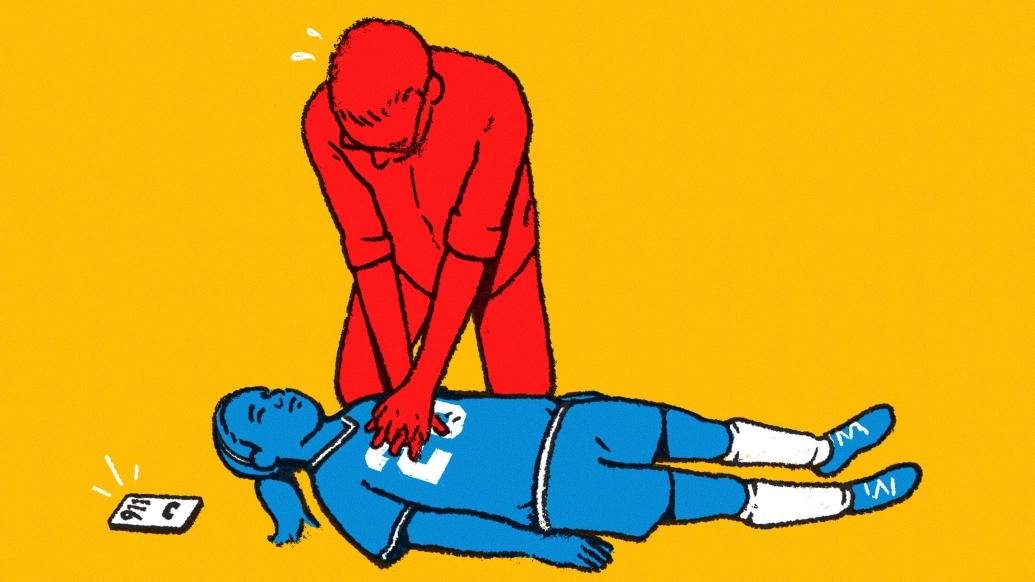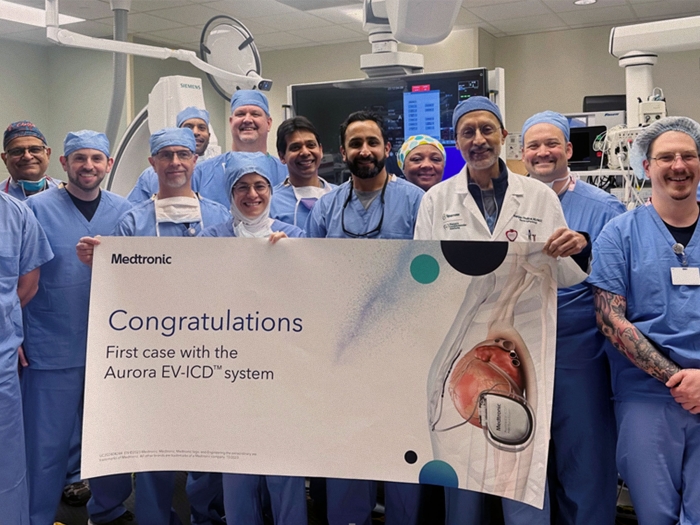News of a young seemingly healthy athlete collapsing can be concerning for parents, but sports don’t increase risk, a pediatric cardiologist says
11:15 AM
Author |

Sudden cardiac arrest often makes headlines when it affects a young athlete whose heart unexpectedly stops beating during a sports event.
The condition captured the national spotlight following several high profile cases, including news that NBA star LeBron James’ son Bronny James collapsed during basketball practice at college in summer 2023 due to an underlying congenital heart condition.
For parents with kids and teens in youth sports, these stories may be understandably worrisome. But it’s important to recognize that athletes have about the same low risk of experiencing a sudden cardiac arrest as anyone else, says David Bradley, M.D., a pediatric cardiologist at University of Michigan Health C.S. Mott Children’s Hospital.
“When sudden cardiac arrest affects a well known young athlete or a local teen in community it highlights the sudden and unexpected nature of this condition,” Bradley said.
“However, sudden cardiac arrest can happen to anyone, making it important to know how to prevent, recognize, and respond to it.”
Bradley answers top questions from parents regarding the condition:
Should parents worry if sports are safe for their child?
Bradley: Athletics are not any more risky than regular life activities and physical activity is encouraged for long term heart health.
It’s important for parents to understand that sudden cardiac arrest is not more likely among those who play sports. It’s also important to emphasize that the risks for everybody are low. This is a rare phenomenon.
We encourage young people to participate in sports and also encourage regularly attending doctor’s visits where these issues can be discussed.
Sudden cardiac arrest can happen to anyone, making it important to know how to prevent, recognize, and respond to it.” David Bradley, M.D.
What causes this condition?
Bradley: Some patients have a heart diagnosis from birth known to put their heart at risk of sudden cardiac arrest, such as hypertrophic cardiomyopathy and coronary artery anomalies.
In some of these patients, precautions or medications should be taken to decrease risks. That may include avoiding certain competitive sports or other activities.
Though rare, young patients including children and teens, may experience a sudden cardiac arrest without any prior warning. Some congenital heart conditions and heart problems that cause sudden cardiac arrest can’t be detected with routine testing, such as a heart arrythmia causing an irregular heart rhythm. But again, this is not a common occurrence.
What are outcomes of sudden cardiac arrest in athletes and other young people?
Bradley: Sudden cardiac arrest death in young people is rare with about a quarter of cases occurring during sports.
About 2,000 young, seemingly healthy people under age 25 in the United States die each year of sudden cardiac arrest, according to the Centers for Disease Control and Prevention.
While it’s the leading cause of exercise related death in young competitive athletes, the risk is still far lower than the odds of deaths from other causes like accidents and firearms. The American Academy of Pediatrics recommends that all children be screened for conditions that can lead to cardiac arrest or death, regardless of their athletic status, especially as they enter middle school or high school.
How do you know if your child may be experiencing cardiac arrest and what should you do?
Bradley: A cardiac arrest can look like different things, including a seizure or loss of consciousness. While not all symptoms indicate a cardiac arrest, fainting with exercise should prompt parents to explore their child’s risks for sudden cardiac arrest.
If someone seems to faint and isn’t responsive, immediately call for help and perform CPR. If available, an automated external defibrillator, or AED, should be used to detect problems in heart rhythm and deliver shocks to reset the heart if necessary.
Even if you’re in doubt that it’s a heart issue, use an AED, which can’t hurt the person. Always err on the side of caution. Nobody will judge you if you get the AED for an unresponsive person, and it’s not needed.
Can we reduce a person’s risk?
Bradley: Most sudden cardiac arrests don’t occur during a sporting event but at home where’s there’s likely less access to resources such as CPR trained staff and AEDs.
Even though roughly three quarters of out of hospital cardiac arrests happen in a home setting, there hasn’t been widespread focus on preparing and practicing for this emergency.
Just over 6% of people survive in-home cardiac arrest. In contrast, most schools are better prepared for these situations through CPR and AED training. The same is true for many athletic venues and other community organizations. This is the result of years of advocacy work and education on how critical preparedness is to improving outcomes and survival from sudden cardiac arrest by groups such as Project ADAM and the Michigan HEARTSafe Schools program that Mott supports.
The best way to decrease risks for the kids who are out there that have risks we don’t know is to make their community safe — by ensuring access to AEDs and increasing the number of people trained in lifesaving CPR skills.
We need a community with enough AEDs and people trained in CPR that resuscitations like the ones we’ve seen in the news are possible not just for pro athletes but anyone who has a sudden cardiac arrest.
Sign up for Health Lab newsletters today. Get medical tips from top experts and learn about new scientific discoveries every week by subscribing to Health Lab’s two newsletters, Health & Wellness and Research & Innovation.
Sign up for the Health Lab Podcast: Add us on Spotify, Apple Podcasts or wherever you get you listen to your favorite shows.

Explore a variety of healthcare news & stories by visiting the Health Lab home page for more articles.

Department of Communication at Michigan Medicine

Want top health & research news weekly? Sign up for Health Lab’s newsletters today!





